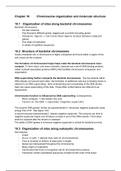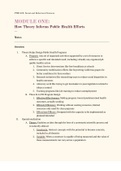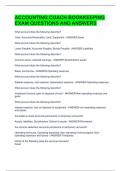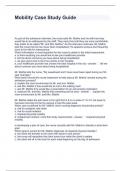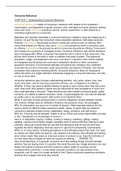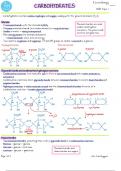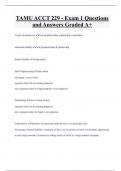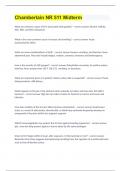Chapter 10 Chromosome organization and molecular structure
10.1 Organization of sites along bacterial chromosomes
Bacterial chromosome:
- Circular molecule
- Few thousand different genes, biggest part is protein-encoding genes
- Intergenic regions → non-transcribed regions located between adjacent
genes
- One origin of replication
- A variety of repetitive sequences
10.2 Structure of bacterial chromosome
Inside a bacterial cell, a chromosome is highly compacted and found within a region of the
cell, known as the nucleoid.
The formation of chromosomal loops helps make the bacterial chromosome more
compact. To form micro- and macro domains, bacteria use a set of DNA-binding proteins,
called nucleoid-associated proteins (NAPs) that facilitate chromosome compaction and
organization.
DNA supercoiling further compacts the bacterial chromosome. The two strands within
DNA already coil around each other, the formation of additional coils due to twisting forces is
referred to as DNA supercoiling. Both underwinding and overwinding of the DNA double
helix can cause supercoiling of the helix. These DNA conformations are referred to as
topoisomers.
Chromosome function is influenced by DNA supercoiling. Consequences:
- More compact → decreases the size
- Tension on the DNA → separation (negative supercoils)
The enzyme DNA gyrase, known as topoisomerase II, introduces negative supercoils using
energy from ATP. See figure 10.6
A second enzyme topoisomerase I, relaxes negative supercoils. This enzyme can bind to
negative supercoils region and introduce a break in one of the DNA strands. The broken
strand is repaired after the tension is released.
The ability of DNA gyrase to introduce negative supercoils is critical for bacterial survival.
10.3 Organization of sites along eukaryotic chromosomes
Key features:
- Linear
- Occur in sets → diploid (two sets of chromosomes)
- Tens to hundred of millions of base pairs in length
- Genes are interspersed throughout the chromosome
- Many origins of replication
- Centromere that forms a recognition site for the kinetochore proteins
- Telomeres contain specialized sequences located at both ends of the linear
10.1 Organization of sites along bacterial chromosomes
Bacterial chromosome:
- Circular molecule
- Few thousand different genes, biggest part is protein-encoding genes
- Intergenic regions → non-transcribed regions located between adjacent
genes
- One origin of replication
- A variety of repetitive sequences
10.2 Structure of bacterial chromosome
Inside a bacterial cell, a chromosome is highly compacted and found within a region of the
cell, known as the nucleoid.
The formation of chromosomal loops helps make the bacterial chromosome more
compact. To form micro- and macro domains, bacteria use a set of DNA-binding proteins,
called nucleoid-associated proteins (NAPs) that facilitate chromosome compaction and
organization.
DNA supercoiling further compacts the bacterial chromosome. The two strands within
DNA already coil around each other, the formation of additional coils due to twisting forces is
referred to as DNA supercoiling. Both underwinding and overwinding of the DNA double
helix can cause supercoiling of the helix. These DNA conformations are referred to as
topoisomers.
Chromosome function is influenced by DNA supercoiling. Consequences:
- More compact → decreases the size
- Tension on the DNA → separation (negative supercoils)
The enzyme DNA gyrase, known as topoisomerase II, introduces negative supercoils using
energy from ATP. See figure 10.6
A second enzyme topoisomerase I, relaxes negative supercoils. This enzyme can bind to
negative supercoils region and introduce a break in one of the DNA strands. The broken
strand is repaired after the tension is released.
The ability of DNA gyrase to introduce negative supercoils is critical for bacterial survival.
10.3 Organization of sites along eukaryotic chromosomes
Key features:
- Linear
- Occur in sets → diploid (two sets of chromosomes)
- Tens to hundred of millions of base pairs in length
- Genes are interspersed throughout the chromosome
- Many origins of replication
- Centromere that forms a recognition site for the kinetochore proteins
- Telomeres contain specialized sequences located at both ends of the linear


